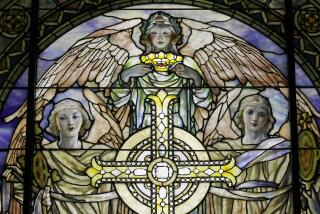He Describes Pure Spirits, Made in God’s Image : Pope Says Angels’ Intellect Exceeds Humans’
- Share via
VATICAN CITY — Pope John Paul II, stressing the importance to mankind of discussing angels, said Wednesday that angels have intellect and free will but to “a greater degree” than humans.
The Pope also defended his recent series of weekly talks on angels, during which he has been restating some of Roman Catholicism’s most traditional teachings.
John Paul, speaking to 8,000 pilgrims and tourists at his regular weekday audience, described angels as pure spirits who are immortal because they have no bodies.
“The angels are gifted with an intellect and free will, like man, but to a greater degree than him,” John Paul said. “Angels therefore are personal beings and, inasmuch, are also made in the image and likeness of God.”
The Polish-born Pope began speaking about the existence of good and bad angels last month, and the unusual topic has elicited responses from his listeners ranging from amusement and incredulity to confusion and curiosity.
John Paul appeared to be defending his decision to discuss the issue when he acknowledged to the crowd that the idea of angels “might seem far away or less vital to the mentality of modern man.” But the church, he said, does a great service to mankind when discussing angels because it underlines man’s spiritual, as opposed to material, reality.
During his address, delivered in Paul VI Auditorium adjacent to St. Peter’s Basilica, John Paul restated traditional scriptural references to angels, noting that scripture writers gave them personal names like Gabriel, the angel who announced to Mary that she would bear Jesus, and Michael, the soldier-angel who fought Lucifer.
He also restated medieval church teaching that breaks angels into nine different “choirs” or classes, including:
Seraphim (the highest order), cherubim (the second highest order, said to have kept the gate of paradise after the fall of Adam and Eve), thrones, powers, dominations, virtues, principalities, angels and archangels.
It was during medieval times that church scholars debated ethereal questions such as how many angels could fit on the head of a pin. Twentieth-century Catholic schoolchildren, taught that angels are bodiless, pure spirits, quickly learned the answer: as many as want to.
More to Read
Sign up for Essential California
The most important California stories and recommendations in your inbox every morning.
You may occasionally receive promotional content from the Los Angeles Times.











